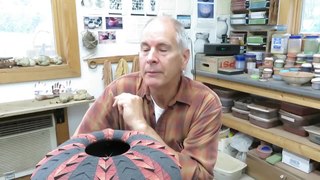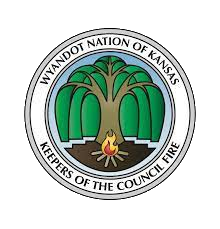
The Wyandot people are Indigenous peoples of the Northeastern Woodlands of North America, and speakers of an Iroquoian language, Wyandot.

Wyandot is the Iroquoian language traditionally spoken by the people known as Wyandot or Wyandotte, descended from the Tionontati. It is considered a sister to the Wendat language, spoken by descendants of the Huron-Wendat Confederacy. It was last spoken, before its revival, by members located primarily in Oklahoma, United States, and Quebec, Canada. Linguists have traditionally considered Wyandot as a dialect or modern form of Wendat.

The Sac and Fox Nation is the largest of three federally recognized tribes of Sauk and Meskwaki (Fox) Indian peoples. Originally from the Lake Huron and Lake Michigan area, they were forcibly relocated to Oklahoma in the 1870s and are predominantly Sauk. The Sac and Fox Oklahoma Tribal Statistical Area (OTSA) is the land base in Oklahoma governed by the tribe.

Wendake is the current name for two urban reserves, Wendake 7 and Wendake 7A, of the Huron-Wendat Nation in the Canadian province of Quebec. They are enclaves entirely surrounded by the La Haute-Saint-Charles borough of Quebec City, within the former city of Loretteville. One of the Seven Nations of Canada, the settlement was formerly known as Village-des-Hurons, and also as (Jeune)-Lorette.
The Huron-Wendat Nation is an Iroquoian-speaking nation that was established in the 17th century. In the French language, used by most members of the First Nation, they are known as the Nation Huronne-Wendat. The French gave the nickname “Huron” to the Wendat, meaning “boar's head” because of the hairstyle of Huron men. Wendat (Quendat) was their confederacy name, meaning “people of the island” or "dwellers on a peninsula."

The Wyandotte Nation is a federally recognized Native American tribe headquartered in northeastern Oklahoma. They are descendants of the Wendat Confederacy and Native Americans with territory near Georgian Bay and Lake Huron. Under pressure from Haudenosaunee and other tribes, then from European settlers and the United States government, the tribe gradually moved south and west to Michigan, Ohio, Kansas, and finally Oklahoma in the United States.

The Schaghticoke are a Native American tribe of the Eastern Woodlands who historically consisted of Mahican, Potatuck, Weantinock, Tunxis, Podunk, and their descendants, peoples indigenous to what is now New York, Connecticut, and Massachusetts. The remnant tribes amalgamated in the area near the Connecticut-New York border after many losses, including the sale of some Schaghticoke and members of neighboring tribes into slavery in the Caribbean in the 1600s.
State-recognized tribes in the United States are organizations that identify as Native American tribes or heritage groups that do not meet the criteria for federally recognized Indian tribes but have been recognized by a process established under assorted state government laws for varying purposes or by governor's executive orders. State recognition does not dictate whether or not they are recognized as Native American tribes by continually existing tribal nations.
John L. Steckley is a Canadian scholar specializing in Native American studies and the Indigenous languages of the Americas. Steckley has a PhD in Education from the University of Toronto. He taught at Humber College in Toronto, Ontario, from 1983 until his retirement in June 2015.

Eliza Burton "Lyda" Conley was a Wyandot Native American and an American lawyer. She was the first woman admitted to the Kansas Bar Association. She was notable for her campaign to prevent the sale and development of the Huron Cemetery in Kansas City, now known as the Wyandot National Burying Ground. She challenged the government in court, and in 1909 she was the first Native American woman admitted to argue a case before the Supreme Court of the United States.
The Zane family was important to the early history and settlement of western Virginia and the U.S. state of Ohio. Brothers Ebenezer (1747–1811) and Isaac Zane both served in the Virginia House of Delegates before moving westward. They laid out sections of the Ohio Country, including the municipalities of Zanesville and Zanesfield. Their sister Betty Zane (1759–1823), was a heroine of the Revolutionary War.

The Huron Indian Cemetery in Kansas City, Kansas, also known as Huron Park Cemetery, is now formally known as the Wyandot National Burying Ground. It was established circa 1843, soon after the Wyandot had arrived following removal from Ohio. The tribe settled in the area for years, with many in 1855 accepting allotment of lands in Kansas in severalty. The majority of the Wyandot removed to Oklahoma in 1867, where they maintained tribal institutions and communal property. As a federally recognized tribe, they had legal control over the communal property of Huron Cemetery. For more than 100 years, the property has been a source of controversy between the federally recognized Wyandotte Nation, based in Oklahoma, which wanted to sell it for redevelopment, and the much smaller, unrecognized Wyandot Nation of Kansas, which wanted to preserve the burying ground.

The Sac and Fox Nation of Missouri in Kansas and Nebraska is one of three federally recognized Native American tribes of Sac and Meskwaki (Fox) peoples. Their name for themselves is Nemahahaki and they are an Algonquian people and Eastern Woodland culture.

The Miami Nation of Indiana is a group of individuals who identify as Miami and have organized as a 501(c)(3) nonprofit organization. The group's headquarters are at Peru, Indiana.

The Echota Cherokee Tribe of Alabama is a state-recognized tribe in Alabama and Cherokee heritage group. It is based in northern Alabama and gained state-recognition under the Davis-Strong Act in 1984.
The Wyandot of Anderdon Nation is an self-identifying tribe and nonprofit organization headquartered in Trenton, Michigan, on the Detroit River.

Matthew Mudeater was a chief of the Wyandotte Nation. A farmer by trade, Mudeater was a prominent member of his tribe and played a key role in gaining United States citizenship for his people. When tensions began to rise in the Wyandotte home of Kansas, he led much of his people to settle in Indian Territory.











